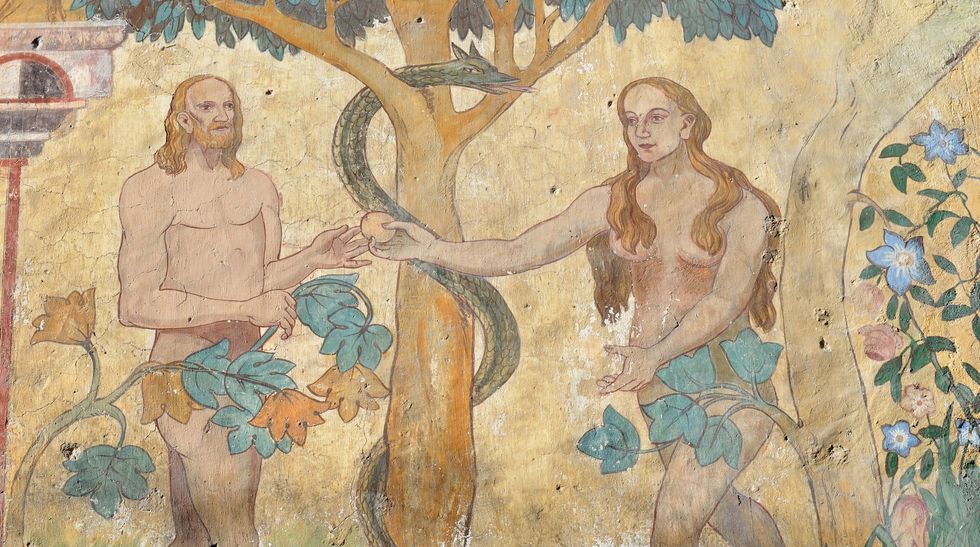Beware! The danger of the knowledge of good and evil is real and present today
This last week, after a furious morning of teaching back-to-back classes, I plopped my tired body into my office chair and began eating my lunch. With these few minutes between responsibilities, I opened my computer to check the news as I ate my food. Before the first bite was swallowed, my screen was flooded with a predictable flood of stories that entirely captured my already-exhausted attention: A famous musician had been arrested for sexual abuse, another war was looking to break out in a distant land, another politician had been caught lying, and another church leader had fallen. Soon, these tidbits of devastation consumed me as I nearly forgot the lunch before me. This world of knowledge was displacing me from being present to where I was — and needed to be. Knowledge is a gift from God. However, knowledge and information are not the same thing. In the information age of our moment, something often gets ignored by the content that consumes our lives. While we can all celebrate the gifts of living in an information age, we can also acknowledge its pitfalls and deceptions. One of these, I believe, is that there is a form of knowledge that displaces us from being present to God and each other. This knowledge is the kind of knowledge that is not used to love, serve, or help others. Rather, it is knowledge that is known for sheer distraction and novelty. This is the knowledge of good and evil.God’s command not to eat from the 'tree of the knowledge of good and evil' implies they did not know evil. But after disobeying God’s good command, they gain a new knowledge that would be their ruin. A little backstory: Humans were created in a state of sinless innocence. In the beginning, they knew only the good — what God had said to them. Trusting, obeying, and relying on God’s word, they were attached to God as babies are to their parents, living in a sacred Edenic environment, initially free of deception, betrayal, or sin. This original state reflected the nature of the God who created it. A good God creates only good things, and the biblical witness consistently describes God as a creator of perfect works (2 Samuel 22:31, Matthew 5:48). As Deuteronomy 32:4 says, “He is the Rock, his works are perfect, and all his ways are just.” The first humans, likewise, are portrayed as beings embodying this state of innocence and goodness, existing in a world free of sin, shame, and the repercussions of the curse.As the creation story states, “Adam and his wife were both naked, and they felt no shame” (Genesis 2:25). Creation was in mint condition. Solomon’s words underscore this state of being: “God created mankind upright, but they have gone in search of many schemes” (Ecclesiastes 7:29). The Hebrew word yashar, used here to describe their "uprightness," has a broad range of meanings throughout the Hebrew Bible, including straightness, honesty, uprightness, integrity, and consistency. This language appears to describe not only the humans’ physical condition but also their moral state. Their bodies worked the way they were supposed to. And there was no taint of sin, deceit, deception, or evil within them. Thus, when God instructed the humans to eat freely from any tree in the garden except the tree of the knowledge of good and evil, they willingly obeyed, knowing and trusting that what God said was true and reliable (Genesis 2:16-17). This highlights two core features of this state of innocence. First, the state of innocence was freely chosen. Considering that the first words God spoke to humans were “you are free” (Genesis 2:16), it’s evident that their moral uprightness was neither forced nor coerced. They genuinely trusted and believed God’s word. And they genuinely lived in a space where they were given the possibility to stumble. To that end, second, it appears as though God has built into his good world a distinct possibility for self-chosen rebellion. By placing a forbidden tree in the center of Eden, God allowed the humans the opportunity to choose disobedience. Innocence, in this sense, is a state of moral freedom that inherently assumes the possibility of disobedience. God’s acknowledgment of this is evident when the humans do disobey, holding them responsible for their actions: “Have you eaten from the tree that I commanded you not to eat from?” (Genesis 3:11)So, is this a perfect world? The word “perfect” can be somewhat misleading. It’s critical to note that the creation account of Genesis 1-3 never once utilizes the language of perfection to describe creation. Instead, time and again, creation is described as “good” (Hebrew tov) on each successive day. A pattern that repeats itself through day six when everything is declared as tov me'od — or “very good.” Never once is Eden described as “perfect.” Even the passage in Deuteronomy referring to God’s works as “perfect” requires clarification. The Hebrew word tammim does not align with the Western concept of perfection. Rather, it refers to something unscathed, fr


This last week, after a furious morning of teaching back-to-back classes, I plopped my tired body into my office chair and began eating my lunch. With these few minutes between responsibilities, I opened my computer to check the news as I ate my food. Before the first bite was swallowed, my screen was flooded with a predictable flood of stories that entirely captured my already-exhausted attention: A famous musician had been arrested for sexual abuse, another war was looking to break out in a distant land, another politician had been caught lying, and another church leader had fallen.
Soon, these tidbits of devastation consumed me as I nearly forgot the lunch before me. This world of knowledge was displacing me from being present to where I was — and needed to be.
Knowledge is a gift from God. However, knowledge and information are not the same thing.
In the information age of our moment, something often gets ignored by the content that consumes our lives. While we can all celebrate the gifts of living in an information age, we can also acknowledge its pitfalls and deceptions. One of these, I believe, is that there is a form of knowledge that displaces us from being present to God and each other. This knowledge is the kind of knowledge that is not used to love, serve, or help others. Rather, it is knowledge that is known for sheer distraction and novelty.
This is the knowledge of good and evil.
God’s command not to eat from the 'tree of the knowledge of good and evil' implies they did not know evil. But after disobeying God’s good command, they gain a new knowledge that would be their ruin.
A little backstory: Humans were created in a state of sinless innocence. In the beginning, they knew only the good — what God had said to them. Trusting, obeying, and relying on God’s word, they were attached to God as babies are to their parents, living in a sacred Edenic environment, initially free of deception, betrayal, or sin. This original state reflected the nature of the God who created it. A good God creates only good things, and the biblical witness consistently describes God as a creator of perfect works (2 Samuel 22:31, Matthew 5:48). As Deuteronomy 32:4 says, “He is the Rock, his works are perfect, and all his ways are just.” The first humans, likewise, are portrayed as beings embodying this state of innocence and goodness, existing in a world free of sin, shame, and the repercussions of the curse.
As the creation story states, “Adam and his wife were both naked, and they felt no shame” (Genesis 2:25). Creation was in mint condition. Solomon’s words underscore this state of being: “God created mankind upright, but they have gone in search of many schemes” (Ecclesiastes 7:29). The Hebrew word yashar, used here to describe their "uprightness," has a broad range of meanings throughout the Hebrew Bible, including straightness, honesty, uprightness, integrity, and consistency. This language appears to describe not only the humans’ physical condition but also their moral state. Their bodies worked the way they were supposed to. And there was no taint of sin, deceit, deception, or evil within them.
Thus, when God instructed the humans to eat freely from any tree in the garden except the tree of the knowledge of good and evil, they willingly obeyed, knowing and trusting that what God said was true and reliable (Genesis 2:16-17).
This highlights two core features of this state of innocence.
First, the state of innocence was freely chosen. Considering that the first words God spoke to humans were “you are free” (Genesis 2:16), it’s evident that their moral uprightness was neither forced nor coerced. They genuinely trusted and believed God’s word. And they genuinely lived in a space where they were given the possibility to stumble.
To that end, second, it appears as though God has built into his good world a distinct possibility for self-chosen rebellion. By placing a forbidden tree in the center of Eden, God allowed the humans the opportunity to choose disobedience. Innocence, in this sense, is a state of moral freedom that inherently assumes the possibility of disobedience. God’s acknowledgment of this is evident when the humans do disobey, holding them responsible for their actions: “Have you eaten from the tree that I commanded you not to eat from?” (Genesis 3:11)
So, is this a perfect world?
The word “perfect” can be somewhat misleading. It’s critical to note that the creation account of Genesis 1-3 never once utilizes the language of perfection to describe creation. Instead, time and again, creation is described as “good” (Hebrew tov) on each successive day. A pattern that repeats itself through day six when everything is declared as tov me'od — or “very good.” Never once is Eden described as “perfect.” Even the passage in Deuteronomy referring to God’s works as “perfect” requires clarification. The Hebrew word tammim does not align with the Western concept of perfection. Rather, it refers to something unscathed, free of blemish, or complete. For many, the idea of perfection implies a world without pain, difficulty, or frustration.
A way to think about this is to consider the problem of pain. Was this good world God had made a world free from pain?
Ponder this question: Could those first humans, in their state of innocence, have stubbed their toe so badly as to break it? An interesting consideration in this discussion is the human nervous system, which every human has. This intricate network of nerves coordinates nearly every aspect of human movement. When we pick up a glass of water, the nervous system moves our muscles. When we feel thirsty, our nervous system communicates our body’s needs. When we can’t breathe underwater, the nervous system signals pain to our brains that we need to head up for air.
A biblical theology of creation reminds us that every part of the human body was designed and purposed by God. If God created humans to live in a place like Eden, supposedly free from pain or injury, why would he give them a nervous system? The nervous system was not an evolved system of nerves after Eden. Humans had a nervous system in this state of innocence.
God’s brilliant creation of the nervous system seems to signal that God knew in advance that pain would be a real possibility in this state. In fact, Genesis 3:16 clearly suggests that one consequence of living in a sinful world is that the process of bearing and raising children would become significantly more painful than it would have been without sin. However, this assumes that childbirth in a sinless world would still have been difficult and painful. “I will greatly increase your pains in childbearing; with pain, you will give birth to children” (Genesis 3:16). This doesn’t seem to be the introduction of pain into Eden. Rather, this indicates an increase in pain for those who will soon be banished from Eden.
This is why the word “perfect” may not be the best way to describe Eden.
What the Bible means by perfect differs greatly from what a Western reader thinks of as perfect. In a Western world defined by luxury, affluence, and comfort, we often imagine Eden as a place of perfection that more resembles an all-inclusive resort than the creation story depicts.
The tree of knowledge of good and evil was, as my friend Gerry Breshears often says, a 'dangerous' tree. It was good. But very, very dangerous.
It would be more accurate to say that Eden, in its state of innocence, was “good” — not perfect. To add to this, only one being is described as “perfect” throughout all of scripture: God. Neither humans, creation, the cosmos, nor spiritual beings in their pre-rebellious state are given this designation. Even when humans are compared to God, it is clear they are not like their creator. “Be perfect, therefore,” Jesus says, “as your heavenly Father is perfect” (Matthew 5:48).
Jesus knew the situation. God is perfect. Humans are not.
Humans were created in a state of sinless innocence. In the beginning, they knew only the good — what God had said to them. When the serpent speaks, he assumes they did not yet know evil (Genesis 3:5). Later, New Testament writings declare that when the humans ate from the tree, they entered into sin at that moment; assuming they were not sinful beforehand (Romans 5:12, 1 Timothy 2:14). Good was all they knew; there was nothing else to know.
The creation they experienced was marked by the goodness that only comes from a good, holy, and righteous creator. Everything God made reflected his nature, and that was the human experience. Before the serpent’s deception, the humans were without guile or evil, having known only the good. This changes once they eat from the forbidden tree. God’s command not to eat from the “tree of the knowledge of good and evil” implies they did not know evil. But after disobeying God’s good command, they gain a new knowledge that would be their ruin.
At first, they knew only good. Now, they know good and evil.
The one tree that the humans were not to eat from was not a bad tree. No. It was a good tree that God had made. The tree of knowledge of good and evil was, as my friend Gerry Breshears often says, a “dangerous” tree. It was good. But very, very dangerous.
The same goes for all knowledge. Knowledge is good. To know is a gift from God. But some knowledge is simply not for us. It may be good to know. But as the tree of knowledge of good and evil teaches us, being good does not mean it is for us. Sometimes, the good thing is out-of-bounds.
At this moment, we are being tempted to believe that all knowledge (as did the first humans with the first tree) is to be ours. That we can conquer through knowing. And that everything is for us. But this is killing us.
As I ate my lunch, I felt a deep sense of shame and hollowness. Rather than enjoying the ham and pickle sandwich my wife had prepared for me earlier that morning, I enmeshed myself in a world of gossip, news, and punditry that did nothing to form me into being a present person to the Holy Spirit. The news needs to be read. And evil needs to be exposed.
But more than ever, I’m beginning to experience that there is a form of knowledge that displaces us from the Eden of the ever-present presence of God. As we learn to navigate this new information age, we would be wise to recognize that our world isn’t all that different from that of the first humans. Distraction is the devil.
Part of formation in our world is to re-embrace the godly restraint of recognizing we don’t get to have everything we want. Secularity can only give us a gas pedal. It takes the Spirit to learn to brake.
It’s healthy to see that not all knowledge gets to be mine. Some ignorance is a gift — especially the ignorance of evil.
Editor's note: This essay was originally published at Dr. A.J. Swoboda's Substack and was republished with permission.
Originally Published at Daily Wire, World Net Daily, or The Blaze
What's Your Reaction?

































































































